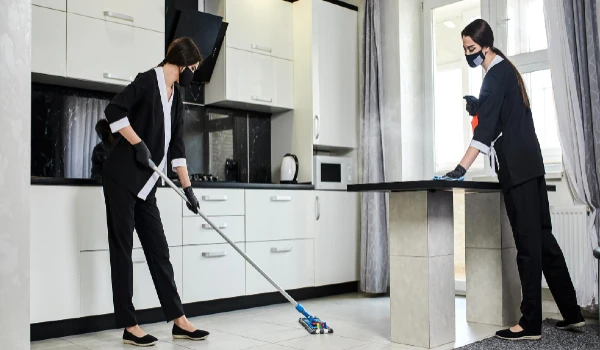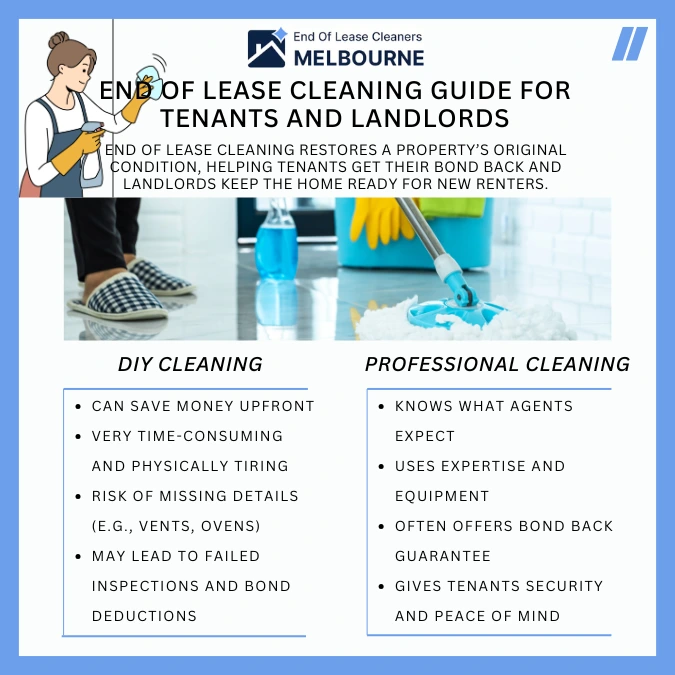End of lease cleaning is the meticulous process of restoring a rental property to its previous condition prior to moving out. For tenants, this step might spell the difference between receiving their entire bond or facing unanticipated deductions. Landlords and property managers, utilise the final inspection to assess if the property has been maintained to the required standard. Even little oversights such as stains on carpets or grime in the oven can spark disputes.
In a busy city like Melbourne where rental turnover is high; top quality end of lease cleaning Melbourne plays a crucial role in ensuring a smooth transition. This article, acts as an end of lease cleaning guide for tenants and landlords. Professional services are in high demand because they understand exactly what real estate agents look for and deliver a spotless result that meets industry expectations.
- Understanding End of Lease Cleaning
- Key Areas Covered in End of Lease Cleaning
- Why Tenants Need End of Lease Cleaning
- Why Landlords Benefit from End of Lease Cleaning
- DIY vs Professional Cleaning
- Tips to Prepare for End of Lease Cleaning
- Infographic: End of Lease Cleaning Guide for tenants and landlords
- Wrapping Up
1. Understanding End of Lease Cleaning
End of lease cleaning, often known as bond cleaning, is a detailed cleaning procedure performed when a tenant moves out. Unlike routine cleaning, it is a thorough cleaning from top to bottom. It ensures that the home looks just as it did when the tenant moved in. From washing skirting boards to eliminating grease from ovens; this cleaning method leaves no surface untouched.
For tenants it is critical because the recovery of their bond is heavily reliant on how effectively the property is maintained. For landlords, it helps maintain property value while also ensuring that incoming tenants experience a clean, inviting atmosphere. Because of this mutual benefit; end of lease cleaning has become an essential component of the renting process.
2. Key Areas Covered in End of Lease Cleaning

End of lease cleaning, covers a wide range of areas; both inside and outside the property. While the checklist can differ depending on the agreement; some common sections include:
- Kitchen appliances including the stovetop, rangehood, oven, and sink should be cleaned. Grease and food residue removal, is often considered one of the most challenging yet essential duties.
- Bathrooms: scrubbing tiles, getting rid of mould and shining up mirrors, shower screens, sinks, and toilets.
- Living Areas and Bedrooms; dusting, vacuuming, and mopping floors. Wiping down walls, doors, skirting boards and windows.
- Outdoor Spaces: sweeping balconies, cleaning the lawn and making sure the driveway or garage is clear of garbage.
End of lease cleaning ensures that the property is in pristine shape which reduces disagreements between landlords and tenants.
3. Why Tenants Need End of Lease Cleaning
For tenants, end of lease cleaning is more than simply a formality; it is very important to securing their bond. Real estate agents and landlords perform thorough inspections and even minor oversights such as dusty blinds or stained carpets can cost tenants a portion of their deposit.
Also, hiring expert cleaners might save you time and effort. Many end of lease cleaning Melbourne companies provide services that are suited to real estate standards. This gives tenants peace of mind, because they know their property will pass inspection without issue. For individuals on a tight schedule; it is an effective solution that prevents them from losing money unnecessarily.
4. Why Landlords Benefit from End of Lease Cleaning
Landlords stand to benefit from a thorough end of lease clean. A sparkling property is far more appealing to prospective tenants which can speed up the leasing process and minimise vacancy periods. Also well maintained houses attract higher rental rates and promote long term tenant satisfaction.
Professional end of lease cleaning, ensures that the property is presented in the best possible shape lowering the likelihood of complaints from new tenants. It also helps landlords; maintain consistency in the quality of their rentals. This builds a very good reputation in the competitive Melbourne rental market.
5. DIY vs Professional Cleaning
Some tenants may opt to do end of lease cleaning on their own. While this can save you money, it is both time consuming and physically demanding. Missing even little details like dust in air vents or grime in the oven can result in failed inspections and bond deductions.
Whereas professional cleaners bring knowledge of what real estate agents look for during inspections, as well as expertise and specialist equipment. Many end of lease cleaning Melbourne companies, even provide a bond back guarantee. This means that if the landlord is dissatisfied, they will clean the property again. For many tenants, the increased security makes professional services a reasonable investment.
6. Tips to Prepare for End of Lease Cleaning
Preparation is essential, for good end of lease cleaning. Tenants and landlords; can both benefit from the following tips
- Check the lease agreement. To avoid surprises, review the cleaning standards mentioned in the contract.
- Declutter before cleaning. Remove personal items and old belongings to make cleaning easier.
- Create a checklist. Having a detailed checklist; ensures that no area is overlooked.
- Pay attention to hidden areas. Do not forget spots like inside cupboards, under furniture, or behind appliances.
- Schedule expert services in advance. If you choose professional cleaning make sure to schedule the service ahead of time to minimise any last minute stress.
By following these steps, tenants can improve their chances of getting their bond back, while landlords can prepare the property efficiently for new tenants.
Infographic: End of Lease Cleaning Guide for tenants and landlords

Wrapping Up
End of lease cleaning entails more than just washing off surfaces; it is about restoring a property to its finest possible condition. For tenants it is the first step towards retrieving their bond and leaving on good terms with their landlords. For landlords it is a very important step in maintaining property value and attracting quality tenants. With good planning and attention to detail it can be a stress free transition from one tenancy to the next.